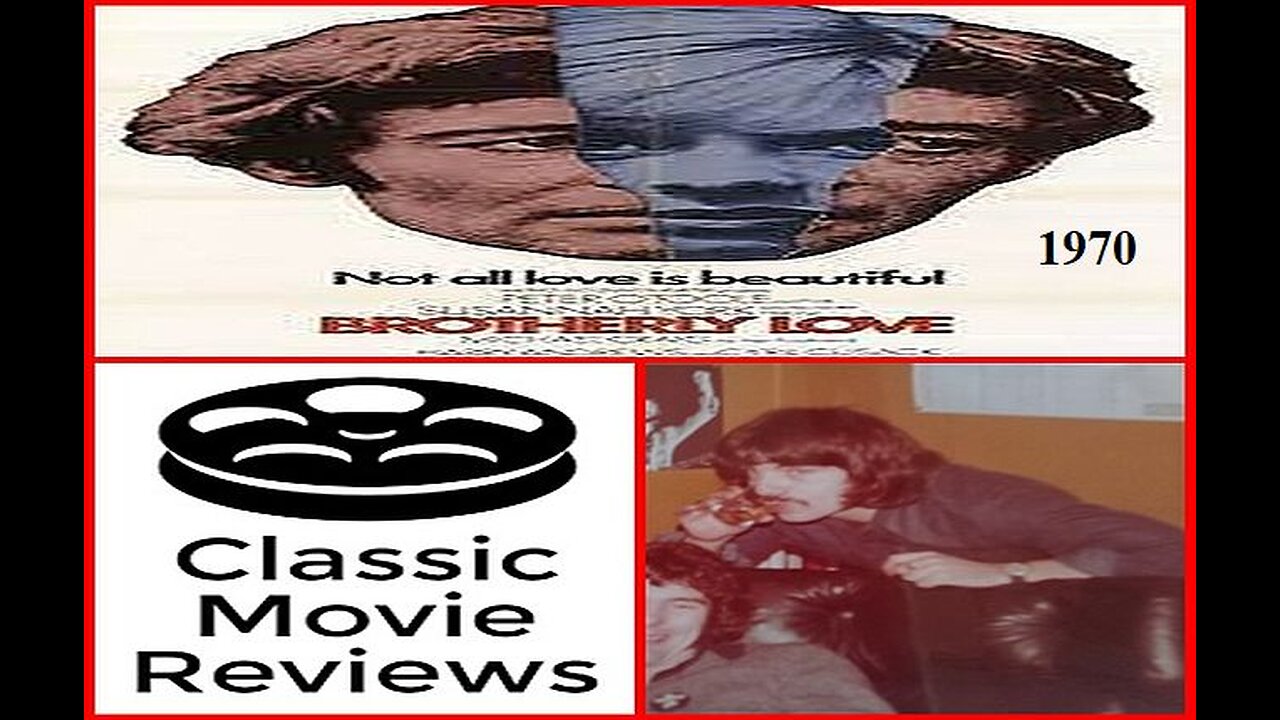Premium Only Content

Brotherly Love 1970 Movie Review
Country Dance (1970)
Screen: Haunting Indecisions of 'Brotherly Love'
By VINCENT CANBY
Published: April 23, 1970
"MUMMY," says Sir Charles Henry Arbuthnot Pinkerton Ferguson (Peter O'Toole), "left me the most extraordinary amount of phenobarbital." She also left him so emotionally dependent on his sister Hilary (Susannah York) that Hilary can't bring herself to leave the family dairy farm to take up residence with her decent, dull husband.
Hilary is not only afraid Pink will attempt suicide again, but she herself quite enjoys the life-their manic squabbles and their sharing of afternoon booze, topped off, perhaps, by a nice hot tub with a toy duck in the bathwater. It's apparent that the duck was not the only thing Pink and Hilary shared in their childhood.
The name of James Kennaway's original novel was "Household Ghosts." When Kennaway adapted it as a play, it was called "Country Dance," which was the title it bore when production began on the film version. During the filming, it was known briefly as "The Same Skin," and yesterday the cinematic ghost of the novel opened at the Paris Theater as "Brotherly Love."
I mention all this because the movie and its two principal characters are haunted by the same sort of indecision that seems to have marked the search for a title. The screenplay, written by Kennaway just before he died in 1968, is a series of scenes, which, although big, are never exactly obligatory. It does seem, in fact, that the movie's real obligatory scenes must have taken place years before, when Pink and Hilary stopped being lovers. The film merely records the events leading to their final inevitable separation.
The course of these events is often tumultuous but never terribly affecting. O'Toole looks so thin and haggard that the enormous energy of his performance comes as a genuine surprise. It also comes to seem completely mechanical. This, however, may partly be the result of Kennaway's foundness for literary dialogue, heavy with dim similes ("Country dances, like country manners, are very old and very true"). The screenplay is also heavy with exposition, a lot of which is given to Miss York, who is an actress of intelligence and humor. Happily she is also endowed with an elastic lower lip that can be stretched around a line such as: "Oh God! Mummy did us enough harm when she was alive. Why did she have to go and die suddenly like that?"
The film was directed by J. Lee Thompson with what is usually referred to as taste. The scenes of rural Scotland are set very prettily. Individual confrontations have a theatrical tension that seems to elude the movie as a whole. Somehow, it is typical of the film that we never see the outside of the house where Hilary and Pink live, although we are in it almost constantly. At the same time, the camera explores their faces and never once suggests what's really going on behind the facades of skin.
"Brotherly love" is so tasteful in this regard-as if it didn't want to shock-that it seems downright platonic, which, under the circumstances, is a bit of a bore.
BROTHERLY LOVE, directed by J. Lee Thompson; screenplay by James Kenaway, based upon his play "Country Dance" and his novel "Household Ghosts;" director of photography, Ted Moore; music by John Addison; produced by Robert Emmett Ginna; released by Metro-Goldwyn-Mayer. At the Paris Theater, 58th Street, West of Fifth Avenue. Running time: 112 minutes. (The Motion Picture Association of America's Production Code and Rating Administration classifies this film "R-restricted, persons under 17 require, accompanying parent of adult guardian.")
Sir Charles Henry Arbuthnot Pinkerton Ferguson . . . . . Peter O'Toole
Hilary . . . . . Susannah York
Douglas Dow . . . . . Michael Craig
Brigadier Crieff . . . . . Harry Andrews
Dr. Maitland . . . . . Cyril Cusack
Rosie . . . . . Judy Cornwell
Jack Baird . . . . . Brian Blessed
Auctioneer . . . . . Robert Urquhart
Benny-the-Pole . . . . . Mark Malicz
-
 1:18:10
1:18:10
Graham Allen
3 hours agoPutin Vows Peace With Trump But WAR Under Biden!! + 400,000 Kids Are MISSING?!
53.9K70 -
 2:11:07
2:11:07
Matt Kohrs
11 hours agoMSTR Squeezes Higher, Bitcoin To $100k & Nvidia Post Earnings || The MK Show
19K1 -
 42:07
42:07
BonginoReport
4 hours agoNikki Haley's Hatred of Tulsi Gabbard Just Made Me a Bigger Fan (Ep.90) - 11/21/24
59K157 -
 28:41
28:41
Professor Nez
10 hours ago🚨BLOOD on their HANDS! The Man Biden & Kamala Flew In Finally Faces JUSTICE for Laken Riley
29.6K18 -
 1:06:27
1:06:27
2 MIKES LIVE
2 hours agoThe Mike Schwartz Show 11-21-2024
7.96K -
 15:07
15:07
PMG
11 hours ago $0.13 earned"President Trump's Cabinet is Amazing!"
13.2K -
 LIVE
LIVE
Vigilant News Network
14 hours agoHeavily-Vaxxed County Faces Grim Reality | The Daily Dose
1,049 watching -
 1:22:22
1:22:22
Game On!
15 hours ago $9.94 earnedRussell Wilson MVP? TNF Steelers vs Browns Game of the Year!
58.9K -
 13:57
13:57
This Bahamian Gyal
15 hours agoSo, now MIKA and JOE want to work with HITLER? Sunny Hostin was right!
36.1K39 -
 59:38
59:38
The Tom Renz Show
18 hours ago"MAGA & Unity With Pastor Bernadette Smith"
22.7K2